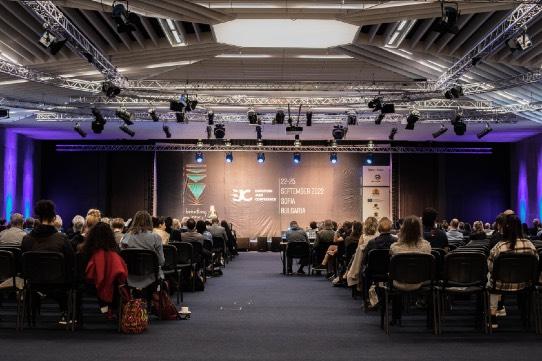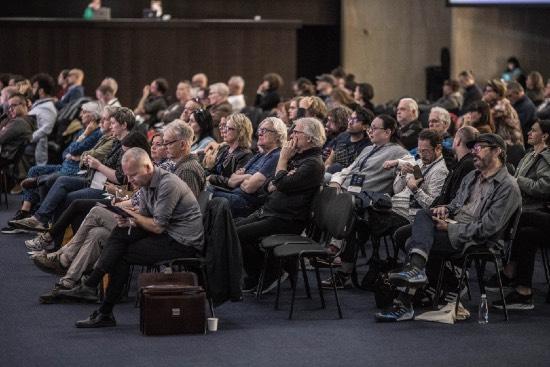
4 minute read
Keynote speech: “At Home in Music” by Alicja Gescinska
KEYNOTE SPEECH
“At Home in Music” by Alicja Gescinska
Advertisement
Polish-born, Belgium-based philosopher and writer Alicja Gescinska began her keynote speech with a question: Does music make humanity and society better? Intuition tells us that ‘yes’, but beyond making our lives nice, does music actually make us morally better? Does it make us better human beings? What motivated her to explore this question was how it seemed irrelevant to philosophers in the past.
When she asked this question to Krzysztof Penderecki, a Polish composer and conductor, his answer was an emphatic ‘no!’ She was very surprised by this, because some of his works addresses world events and social issues, for example: the Polish Requiem (Lacrimosa dedicated for Lech Wałęsa), Threnody for the Victims of Hiroshima (1960) and 1000 Voices for Peace (2014).
Alicja noted that this is an important question for policy makers and the state, because why should they fund music? Why have it in the school curriculum? For example, it is no longer part of education in Belgium anymore, you have to pay for it privately.
Then she outlined the recurrent thinking in philosophy, which is that reason is good and emotions are dangerous. Music plays with our emotions, therefore music can be dangerous; it arouses dangerous passions. Plato (427-347 BC) in The Republic distinguishes music as being able to play a supportive role in the ideal state but that censorship is needed because it awakens irrationality in man as well as powerful emotions. There is can be harmful for the individual and society. Music can be a force for good, but also for bad. And he believed that changes in musical taste and preferences will change society.
Immanuel Kant (1724- 1804) in his Critique of Judgement delineated a hierarchy of the arts, with poetry on top and music at the bottom. This is because for Kant, reason is king. It is what we should be striving for and music is least noble of all the artforms because it arouses emotions. But Kant also admits it is the most enjoyable artform.
Theodor Adorno (1903-1969) of the Frankfurt School was an extreme left-wing philosopher who believed that certain types of music are morally corrupt. He singled out jazz as being particularly corrupting of the soul because it is a product of American capitalism.
George Steiner (1929-2020) stated that ‘humanities don’t humanise.’ Music doesn’t make us better, nor corrupt us. It doesn’t influence us either way ethically or morally. His example it that of Germany, which has beautiful music and a rich cultural heritage but none of that stopped the barbarism of the Nazis, despite the Nazi’s impeccable taste in music and the arts. He believes the Second World War answered that question of morality in music. History in fact is full of examples, Stalin was a fan of music, and conversely, many great musicians weren’t particularly great people
But do art, literature, knowledge of history and music play no role in our moral development at all? Why then do we have this intuition that music, the arts and humanities, make us better? Influences us? Something is happening, but what?
Alicja then stated her main thesis: that music is an exercise in empathy. The key word is exercise, it is not a guarantee. There is only the possibility that you will get better at it the more you practice. What is empathy? According to the Oxford Dictionary, it is the capacity to be emotionally and cognitively in tune with another person, in other words, the ability to understand what goes on in someone else and to be concerned about what goes on in someone else. Empathy increases our understanding of others, ourselves and our society.
1. Understanding the other
For Roger Scruton, music is a dialogue, a gateway to the first-person perspective of the other. For Martha Nussbaum music opens us up to the perspective of the other. But not only classical music; for example, nursery rhymes as well. Vladimir Jankélévitch (1903-1985), a French philosopher, talked about music as a ‘duet of hearts’, an intimate conversation between you and another.
2. Understanding the I
Music is self-discovery, because there is a close link between music and identity. Music is often linked to memories and chapters of our lives, therefore music impacts on how we understand ourselves.
3. Understanding us
Music has the capacity to unite people: in a concert hall, an orchestra, a choir. It unites us as well with people long gone. It is fundamental in community building, collective identity, solidarity, for example the National Anthem. Music allows us to connect to another culture, also allows to keep that culture alive in difficult circumstance, for example in the context of Ukraine.
Alicja concludes that Steiner is right, of course, that humanities don’t humanize. But that is only part of the truth. Music can’t stop bombs or the trains to Auschwitz, but neither did maths or engineering. Without music, without art or humanities, barbarism is on its way.
Music doesn’t solve everything, but it opens our heart, disarms our heart – on the condition that you have a heart. In summary, does music make us better? It depends on your heart!









